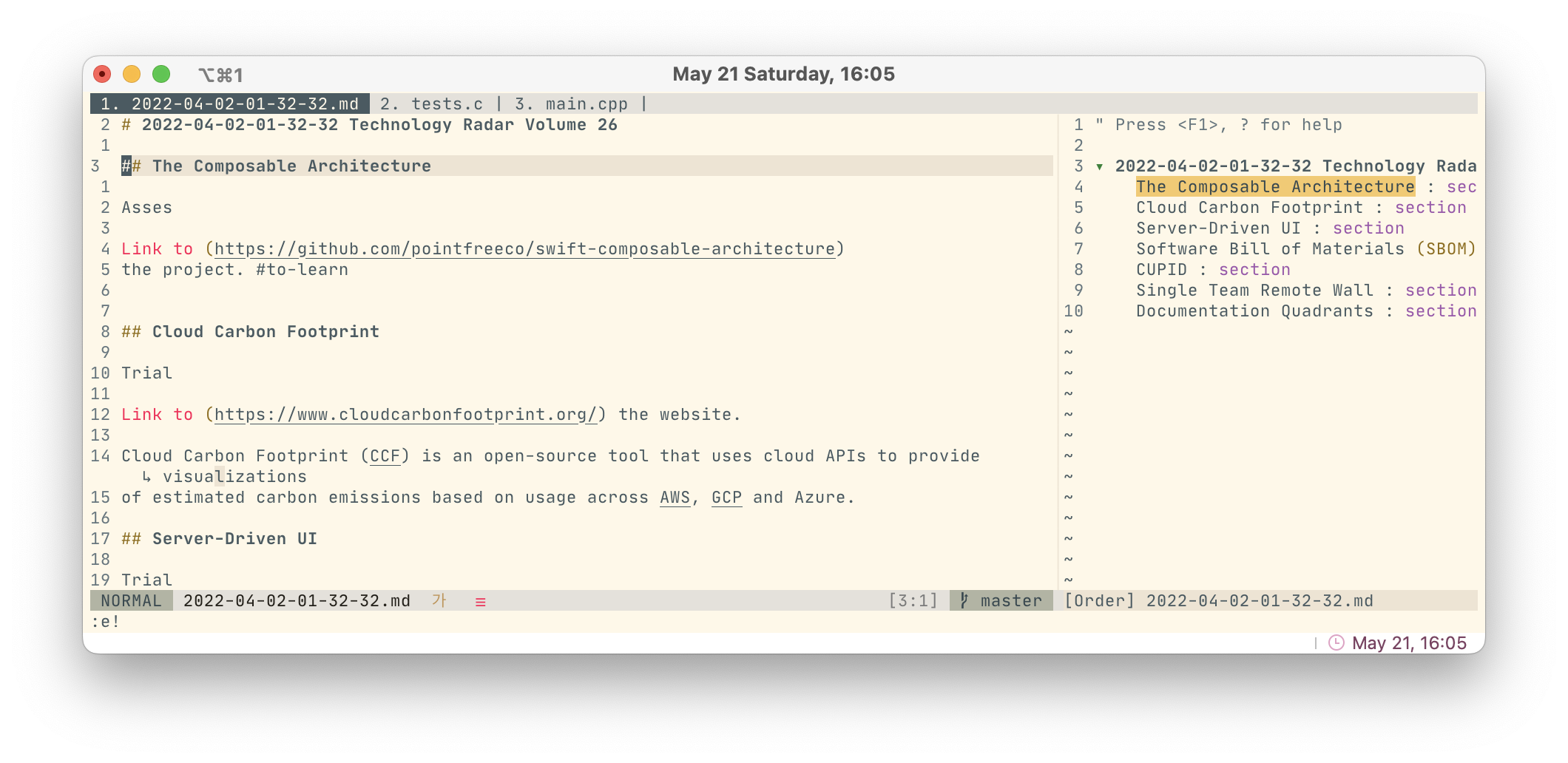-
Notifications
You must be signed in to change notification settings - Fork 10
Home
Since some built-in Vim functionality is not that commonly known this wiki will include life hacks that will increase your understanding of Vim built-ins and also make things easier for you to navigate your notes using zettelkasten.nvim.
Jump to tag [name] and add the matching tags to a location list for the current window. [tagsrch.txt]
You can use this command to list notes that use a particular tag.

You can use this mapping to list all the notes that refer to the note ID under the cursor.

Program to use for the |K| command. [options.txt]
This option is used along side :help :ZkHover command. zettelkasten.nvim automatically sets keywordprg option for the markdown buffer if it has not been set before. Once it's set, you can press K over a note ID and can see its title. If you want to preview the note in the :help preview-window, then you can customize this option to setlocal keywordprg=:ZkHover\ -preview.

By default, zettelkasten.nvim uses a date based ID system. This allows you to maintain the same ID while changing the title of your note as you please. Since the file names are just IDs, it's hard to see what they are about. This is where the browser comes in. Run :ZkBrowse or edit zk://browser and you'll see your notes along with their titles. In here, you can use K to also preview the notes or use tags to jump to them or list other tags.

Put this in your markdown.lua file to preview an image file on macOS.
if vim.fn.executable("qlmanage") == 1 then
vim.api.nvim_buf_set_keymap(
0,
"n",
"<leader>p",
':call jobstart(["qlmanage", "-p", expand("<cfile>")], {"cwd": expand("%:h")})<CR>',
{ noremap = true, silent = true, nowait = true }
)
end
This snippet is directly taken from the documentation. Add the following code to your markdown.lua file:
vim.api.nvim_buf_add_user_command(0, "ZkInsertTOC", function(opts)
vim.api.nvim_buf_set_lines(
vim.api.nvim_get_current_buf(),
opts.line1,
opts.line2,
true,
require("zettelkasten").get_toc(opts.args)
)
end, {
nargs = 1,
range = true,
})
Credit goes to Edwin Wenink.
if vim.fn.executable("ctags") == 1 then
vim.api.nvim_buf_add_user_command(
0,
"MdZkUpdateTags",
"!ctags -R --langdef=markdowntags --languages=markdowntags --langmap=markdowntags:.md --kinddef-markdowntags=t,tag,tags --mline-regex-markdowntags='/(^|[[:space:]])\\#(\\w\\S*)/\\2/t/{mgroup=1}' .",
{
range = false,
}
)
endInstall TagBar and while viewing your note, run :TagBar to view the outline of your note.

You can use the usual buffer manipulation commands (e.g :sort, :g) to change the contents of
the browser. In order to refresh, you just refresh the buffer with :e!.
If you use the default :sort command, you can sort files in ascending or descending date order.
For example, running :sort! will sort the lines in a date descending order, making the first line
your most recent note. If you use :sort, then the first line will be the oldest note.
You can also use your custom sort algorithm to sort the notes in a most recently modified way. You can see an example of this from my dotfiles. Here's the full snippet:
" custom_sort.vim
" Compare Functions {{{
function <SID>compare_modified_time(f1, f2)
let l:mtime1 = getftime(a:f1)
let l:mtime2 = getftime(a:f2)
if l:mtime1 < l:mtime2
return 1
endif
if l:mtime1 > l:mtime2
return -1
endif
return 0
endfunction
function <SID>compare_modified_time_dirvish(f1, f2)
return <SID>compare_modified_time(a:f1, a:f2)
endfunction
function <SID>compare_modified_time_zkbrowser(f1, f2)
return <SID>compare_modified_time(a:f1[:21], a:f2[:21])
endfunction
function s:compare_length(a, b)
let x = strlen(a:a)
let y = strlen(a:b)
return (x == y) ? 0 : (x < y) ? -1 : 1
endfunc
" }}}
function custom_sort#sort_command_completion(A,L,P)
return ["-modified", "-length", "-uniq", "-folder-first"]
endfunction
function custom_sort#sort(mode, start_line, end_line)
if a:mode == "-folder-first" && a:start_line == a:end_line
execute "sort ,^.*[\/],"
return
elseif a:mode == "-folder-first"
execute "'<,'>sort ,^.*[\/],"
return
end
if a:start_line == a:end_line
let l:lines = getline(0, line('$'))
let l:start_index = 1
else
let l:lines = getline(a:start_line, a:end_line)
let l:start_index = a:start_line
endif
if a:mode == "-modified"
if &filetype != "dirvish" && &filetype != "zkbrowser"
echohl Error
echo "[custom-sort] This mode is only available in dirvish/zkbrowser buffers: " . a:mode
echohl Normal
return
endif
if &filetype == "dirvish"
call sort(l:lines, expand("<SID>") . "compare_modified_time_dirvish")
else
call sort(l:lines, expand("<SID>") . "compare_modified_time_zkbrowser")
endif
call setline(l:start_index, l:lines)
elseif a:mode == "-length"
call sort(l:lines, expand("<SID>") . "compare_length")
call setline(l:start_index, l:lines)
elseif a:mode == "-uniq"
call uniq(l:lines)
call setline(l:start_index, l:lines)
else
echohl Error
echo "[custom-sort] Unsupported mode: " . a:mode
echohl Normal
endif
endfunctionAfter this, you can just run :Sort -modified while in :ZkBrowse and the last modified file will
show up at the top.